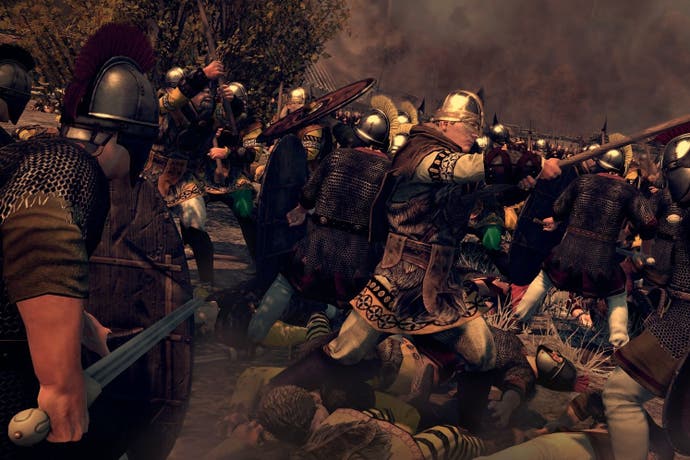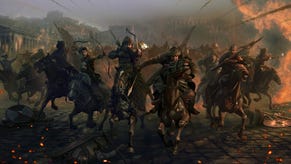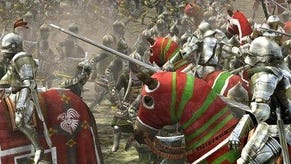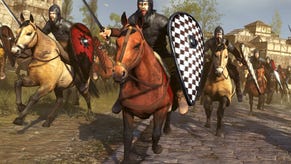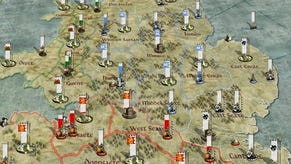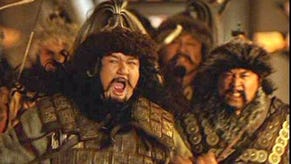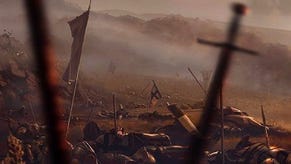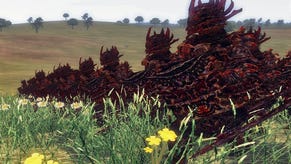Total War: Attila makes you work hard for its love
Hun-ny, I'm home.
Editor's Note: This is an early impressions piece to coincide with the launch of Total War: Attilla today. We'll have a full review, taking into consideration the day one patch, later this week.
There's a lot riding on the arrival of Total War: Attila. While the eponymous anti-hero and fearsome leader of the Huns is borne on box and horse alike, this title also carries with it the hopes of the long-running series' significant fan base. After the learning process necessitated by Total War: Rome 2's post-release incremental updates, this is The Creative Assembly and Sega's chance to prove their reach no longer exceeds their grasp, and they can launch a stable, balanced and content-rich title straight off the bat.
Of course, it's not just about existing fans, as any long-running series requires an injection of new blood to maintain momentum. It's always interesting seeing how established franchises is how well they deliver their concepts to new recruits while still offering the depth to maintain interest over scores if not hundreds of hours of play.
The prologue campaign offers a mix of success and failure on this front. It sensibly promotes early exposure to the Huns who act as a constant threat, roaming the northern reaches of the map and harrying your forces before disappearing back into the forests. After establishing an early foothold with the Visigoths you're soon forced to relocate to escape the growing menace of Attila and his horse-backed hierarchy.
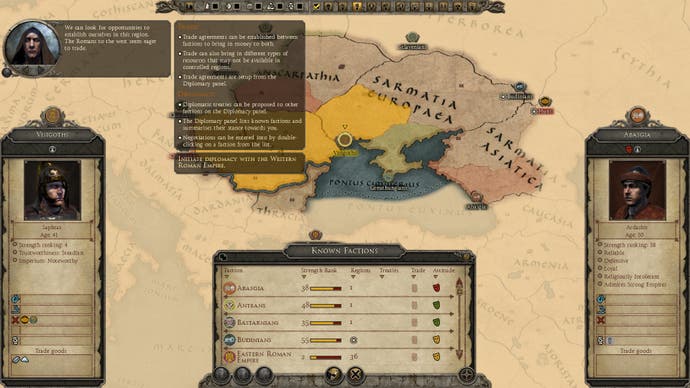
This quickly introduces several of the game's new concepts, such as the horde approach of the migratory barbarian and nomadic factions. Great for those who want to be able to react to the ebb and flow of war, a horde is established when a migratory faction either loses its last city or chooses to abandon it. Razing its own cities and scorching the ground to prevent them from falling into the hands of the enemy, you enter a forced march south to seek refuge behind the lines of the substantial but fractured Roman Empire.
The resulting horde acts as a mobile army, able to encamp to earn some of the bonuses of a fully-formed city. They can also take-up residence in any city they conquer and engage in the internal politics whose canny management is just as vital for the success of your ruling household as the defence of your borders. A balance must be struck between courting public opinion and keeping your cities healthy while also maintaining a powerful presence in the council. Arranging advantageous marriages for your family members can help silence dissenters or, failing that, tragic "accidents" can befall those who have become a political thorn in your side. There's certainly a great deal more to be considered via the diplomacy menu, although a lack of clear explanation of what links an action to one of several consequences or how best to pre-empt growing problems via the research of beneficial technologies can leave you feeling like you're constantly reacting rather than taking a proactive stance.
For a while, though, things go well as your aide issues goals for you to meet on the way to one of several victory conditions. However, this goal-orientated approach has several downsides, the most damaging of which for new players is that they don't necessarily learn the intricacies of the systems that they are being directed to use and so, when that direction stops coming, they are likely to flounder. Even established players may overlook the need to regularly delve into the diplomacy menu to stave off impending war with the significant Eastern and Western Roman Empires. Consequently, it's possible to have to start over if you find yourself at war without warning because you failed to placate your powerful neighbours whose disapproval of your barbaric ways is buried in the diplomacy menu.
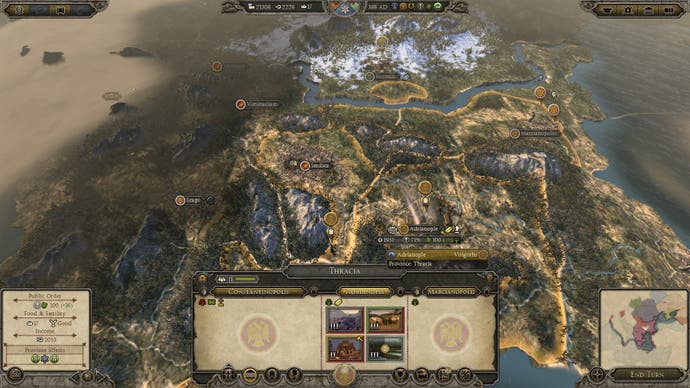
You can also find yourself at the mercy of the changing seasons that can randomly offer bumper harvests one minute and a harsh winter the next as the snow creeps down from the north along with the Huns. Nonetheless, the early integration of several established factions quickly exposes you to their many quirks and stands you in good stead for choosing an appropriate starting point in the campaign proper. Here you can choose to start with a simple, single-city set-up of a barbarian faction or with scores of cities across dozens of provinces of a Roman Empire on the brink of ruin, constantly harried from outside and in by scheming individuals and external forces alike.
When war does eventually arrive, as it surely must, there are similar issues of a lack of clear direction and key information insufficiently surfaced. There's scope for some wonderfully tactical exchanges with the AI, where a small force can be effectively used against a significantly larger army to good effect provided you know what you're doing. Again, the lack of overt information for new recruits is a problem here as the subtleties of morale, individual unit abilities and the importance of flanking manoeuvres is lost in the maelstrom of clashing armies. It makes for an impressive spectacle, especially where adverse weather conditions affect the field of battle and fire can be spread through forests to expose ambushing troops. However, the sheer amount of information available but buried in menus and the game's online encyclopaedia can leave you facing an uphill battle against ignorance as well as the opposing army.
Nonetheless, series fans will appreciate the tweaks to pacing that have made battles more reactive to changes in tactics. Morale, in particular, seems to play a bigger part here than in previous games. The AI is more aware of what its comrades are doing, making routing units a more effective tactic for gaining a foothold when the odds are against you. While it's possible to auto-resolve many battles from the campaign map, the variety of troops, approaches and unique units offered by the ten playable factions makes even smaller skirmishes less of a slog and more open to experimentation.
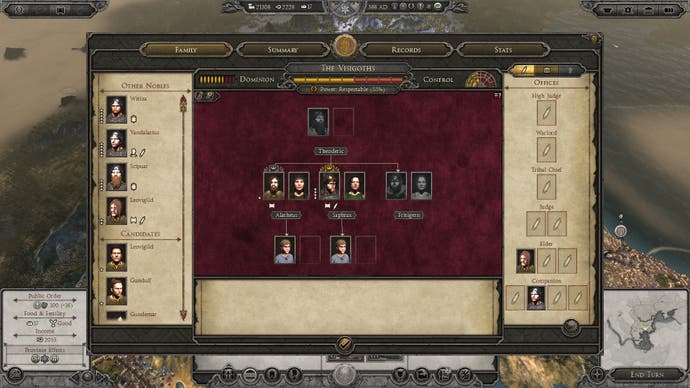
The AI will still make some curious choices when it comes to tiny armies occasionally throwing themselves fruitlessly against impossible odds or failing to break a siege of a city when it has the chance but there are definite improvements overall. However, that may explain why there can be a lengthy wait between turns, even from an early point in the game, as the AI clicks through scores of non-playable factions and my hope is that a confirmed day one patch should iron out at least some of these creases.
There's a great deal more to delve into, with historical battle set-pieces to explore and competitive and co-operative online battles to tackle once the game is release into the wild. For now, though, Total War: Attila stands as refinement of many of the concepts that Rome 2 initially struggled to capitalise on. It's also already a more stable release than its predecessor was and with some additional optimisation of the in-development build that I've been playing on the way to the imminent release of the retail build proper I'm hopeful that some of the issues will be resolved. Even beneath this, though, is a title that feels much more for existing fans of the long-running series than one to welcome in new blood. That's a shame, because although there's a lot here to enjoy, finding that for yourself takes more time than seems necessary or constructive.
